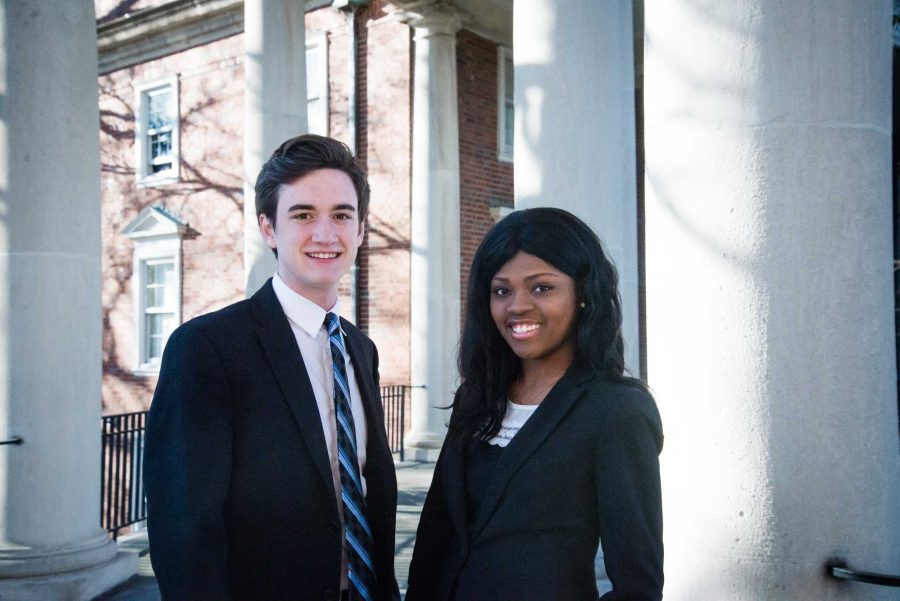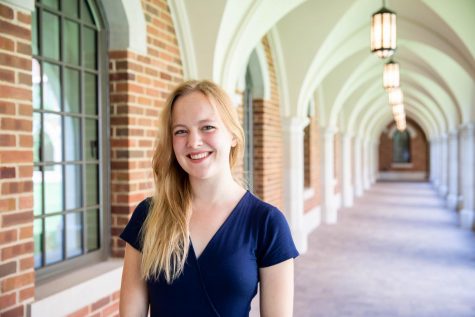This year, Vanderbilt Student Government is focusing its energy on a number of initiatives aimed at improving the student experience at Vanderbilt. These areas of interest, which are based on student input and what the members of VSG themselves see on campus, include things like campus dining, economic inclusivity and sustainability. The Hustler sat down with VSG Vice President Ryan Connor and Speaker of the Senate Molly Gupta to learn more about what VSG is working on this year.
Campus Dining
After spending the 2016-17 school year without an executive director of campus dining, Vanderbilt hired David Ter Kuile to the role this past summer. According to Connor, Ter Kuile has been enthusiastic about establishing a working relationship with VSG to better serve student needs.
“One of the biggest things that’s come a lot out of the campus life committee, but is coming out of VSG more generally as well is a stronger relationship with dining,” Connor said.
Earlier this semester, Campus Dining announced that Chobani yogurts and Quest bars would no longer be considered entrees on the meal plan, and would instead count as sides. Connor said that over time, VSG has received a surprising number of requests for this specific change to be made and they are happy to have been able to work with dining to make it happen. He said that building a relationship with dining this year will help campus dining hear student concerns.
“One of the biggest things is they want to make sure that they’re capturing student input, so the more feedback we get regarding dining issues, the more we can bring those up,” Connor said. “So I think because there hasn’t been a lot of progress in campus dining on some of the initiatives VSG has tried to put forward in the past, we may [now] see a potential higher actualization of some of these ideas.”
Additionally, campus dining is planning to hire a nutritionist this year to assist in assessing the needs of students with specialized dietary needs and restrictions.
“One thing that we’ve been talking to campus dining about and that we’re really excited to be happening soon is they’re hiring a campus nutritionist who will be working with students with special dietary needs and helping also reframe how food is laid out and presented to students as well,” Gupta said. “So that’s really exciting.”
Sustainability
Another initiative VSG is working on is improving sustainability on campus. Connor said that often the efforts that students see coming out of VSG are ones that have been in the works for three to five years and that many current projects, like the sustainability effort, are things current students will not see but future classes will benefit from.
“I think one of the current long term initiatives that I’m really excited about, it’s probably something that no student here will see the fruition of, but working with our residential and environmental affairs committee alongside SPEAR to develop potential sustainability recommendations for the future college halls,” Connor said. “I think it is a really cool initiative that we’ll be talking with the administration about here soon and seeing ways those halls can be built with environmental sustainability in mind. I think it’s kind of another example of this long term function of our larger changes.”
Much of the focus on sustainability comes through partnerships between VSG and FutureVU, Vanderbilt’s long term campus land use plan. While students are only just beginning to see the ways in which FutureVU will change campus, like with the construction of a new college hall series along West End, VSG has spent a lot of their time working on efforts to address potential concerns around FutureVU. Specifically, the sustainability initiative will focus on the potential for utilizing large-scale renewable energy sources in future campus improvement projects.
Economic Inclusivity
The newest VSG committee is the Economic Inclusivity committee, which is currently in its first year of operation. The committee is currently ad hoc, meaning that it will have to be voted on each year to remain active. While VSG has produced economic inclusivity initiatives in the past, such as the creation of Experience Vanderbilt three years ago, Connor said that this new committee will look at economic inclusivity from a wide perspective.
One of the missions of the committee that we’re working with…is this dialogue creation, talking about economic inclusivity at Vanderbilt.
“Economic Inclusivity Committee is really focused on, since EV has really taken this issue of financial inclusivity from the student organization perspective, what are ways that Vanderbilt is either already doing well or could improve on economic inclusivity outside of the student organization perspective,” Connor said. “So looking at potential academic barriers, potential social barriers, like what is disparity in access to the city of Nashville, or experiences in the city of Nashville. I think Passport is a good step, but there might be other ways.”
The committee’s main responsibility this year will be to create an administrative report which explores the issue in depth and provides recommendations to the university for potential action.
“One of the missions of the committee that we’re working with, in tandem with other student leaders, VPB, and primarily Experience Vanderbilt, is this dialogue creation, talking about economic inclusivity at Vanderbilt, give people the context of it, so that in their everyday conversations they’re being economically inclusive,” Connor said. “And then I think we would pass this report on, it’s going to be really critical so that next year, if this committee is renewed, it will have some initiative recommendations that the committee can take up to then start actualizing these things.”
Rideshare
While the economic inclusivity committee will spend the whole year working on the administrative report, Gupta said that there are still initiatives tackling tangible issues in economic inclusivity in the now. One such effort is through the Rideshare Working Group, which is a collaboration between VSG and FutureVU and includes students from VSG as well as representatives from the Dean of Students office. The committee’s function is to look at the ways in which rideshare options like Uber, Lyft, Zipcar, etc. can be utilized to provide students with cost effective transportation options.
Can rideshare be a solution to that? How do we bridge those gaps?
“We’ve been working a lot with Lyft and other campus stakeholders like Vice Chancellor Kopstain’s office to find ways that, when we’re looking at FutureVU and honestly as students next semester, when the West End parking goes away, [ways to utilize rideshare],” Gupta said.
Currently, students are able to pay for Uber using their Commodore Cards, and this year they will be able to receive discounted rides to Passport to Nashville sites. Passport to Nashville, which provides students with free access to venues around the city like the Frist, Country Music Hall of Fame, Johnny Cash Museum, Adventure Science Center and the Hermitage is another way in which VSG is looking at economic inclusivity and access to the city.
Additionally, the rideshare committee is looking for ways partnerships can help reduce the financial burden of transportation for many students. Some students may need to work or have an internship in the city but can’t afford a car or to pay full price for rideshare. One particular thing that Gupta is looking at is the accessibility of off campus mental health providers, a service many students need but one that can often be financially burdensome to students. While the full economic inclusivity report won’t be complete until late next semester, Gupta said this was one of the immediate economic issues VSG is hoping to find ways to alleviate in throughout the year.
“Something that’s happening now that will probably have more immediate impact is conversations about when the mental health changes come down the pipeline, and we’re thinking about the fact that, at least for the foreseeable future, there will still be utilization of off campus providers, but that poses financial issues of a) transportation and b) payment for those providers,” Gupta said. “Can rideshare be a solution to that? How do we bridge those gaps? That is a conversation that’s happening in this moment, it’s not like we’re saying oh wait on that report. So we’re still working on things in tandem to making this report happen.”



